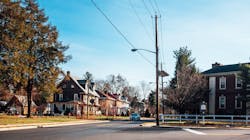NJBPU Approves US$820,000 in Grants for 46 Municipalities to Create Community Energy Plans
The New Jersey Board of Public Utilities (NJBPU) approved Community Energy Plan Grants (CEPG) for 46 municipalities throughout New Jersey, totaling US$ 820,000. In late 2021, the Board redesigned the program to incorporate a greater emphasis on equity and overburdened municipalities. The redesigned program also simplified the grant application process and reduces barriers to program utilization (Awardees).
The CEPG program empowers local communities to create community energy plans that align with the State’s Energy Master Plan, the roadmap to reaching Governor Murphy’s goal of 100% clean energy by 2050. The program encourages communities to create localized community energy plans to combat climate change with a specific focus on equitable access, energy resilience, renewable energy, and efficiency.
“After redesigning the program, we received a strong response to the grant from dozens of communities all across New Jersey,” said Joseph L. Fiordaliso, president, NJBPU. “This program brings activities to combat climate change to the local level, especially in overburdened municipalities which have often borne the brunt of pollution.”
“Municipalities have tremendous authority over our energy future,” said Randall Solomon, executive director of Sustainable Jersey. “We are grateful for the opportunity to partner with the Board of Public Utilities to create a program that helps municipalities comprehensively identify and implement strategies to address climate change and build a sustainable energy future.”
Sustainable Jersey will be providing technical assistance to grant applicants and in the creation of community energy plans for overburdened municipalities.
There are two grant award levels in the redesigned program. All municipalities are eligible for US$ 10,000 awards. However, overburdened municipalities are eligible for a larger award of US$ 25,000, as well as enhanced support, including technical assistance to develop and submit an application and assistance in creating a plan if a grant is awarded. Overburdened municipalities were defined using both the Department of Environmental Protection’s “Overburdened Community” census tract data and the New Jersey Department of Community Affairs’ Municipal Revitalization Index.
In awarding the grants, the Board found that the 46 municipalities all submitted complete applications and thus were eligible to receive a grant. Overall, 24 of the 46 approved applications are from overburdened municipalities. By redesigning the grant program, the Board was able to increase access to communities who historically have had a low participation rate in State clean energy initiatives and move closer to reaching Governor Murphy’s clean energy goals.
